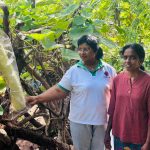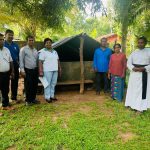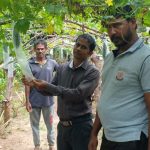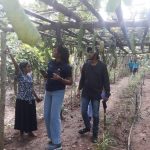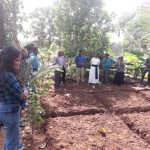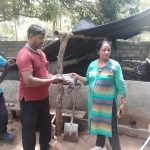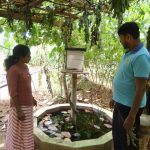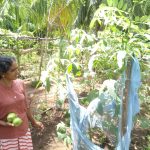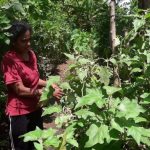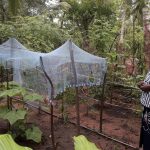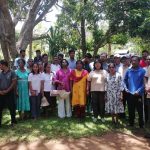Caritas Sri Lanka – SEDEC in collaboration with its network, is implementing a Food Security program titled “Improving Rural Livelihoods, Enhancing Food Security, and Building Climate Resilience in Sri Lanka.” This initiative is spearheaded by Rev. Fr. Luke Nelson Perera, National Director of Caritas Sri Lanka – SEDEC, with support from Caritas Norway. The program aims to improve food security for 26,200 subsistence farming households, including marginalized urban and rural communities in select villages across Sri Lanka. It specifically targets vulnerable groups such as war widows, women, youth, persons with disabilities, and 32,500 schoolchildren, equipping them with knowledge of sustainable agricultural practices and home gardening. Additionally, the program focuses on 13,000 mothers of preschool children, working to safeguard their children from malnutrition by 2028. Already, the program has fostered significant positive change in rural communities across Sri Lanka. Below, we share one such inspiring story of transformation.
My name is R.A. Kumarika Ranaweera, and I am 48 years old. I live in a village called Sumudugama, located in the Thalawa Divisional Secretariat Division of Anuradhapura. I am a mother of two children, and together with my husband, we lead a very happy family life.
In 2023, Caritas Anuradhapura – Sethsaviya introduced the Food Security Program to our village. This initiative, supported by Caritas Norway, is being implemented by Caritas Sri Lanka’s network across all 25 administrative districts in Sri Lanka. Through this program, Caritas Anuradhapura provided us with valuable training in sustainable home gardening practices, with a focus on composting without chemical additives. The goal was to ensure a toxin-free and sustainable food supply for our households. We learned how to prepare compost using the “Jeewakotuwa” method and the Pit method, as well as how to create natural pest repellents (such as Magoza leaf extraction, Gliricidia leaf extraction, and garlic solution) and liquid fertilizers. Additionally, we were taught how to select and prepare a Home garden that is resilient to Sri Lanka’s changing climate.
As part of the program, we received traditional seeds, poly bags, and micro-sprinkler irrigation systems from Caritas Anuradhapura. Agronomists, agricultural instructors, and Caritas Food Security staff provided expert guidance throughout the process. Exposure visits to an agronomist’s home garden sparked great interest among us, where we learned practical Home gardening techniques, such as proper pruning. We were also introduced to the concept of wormy compost and received support with various techniques to improve our gardening.
My entire family has been actively involved in home gardening, which has not only brought us closer together but also increased our overall happiness. What was once unproductive land has now become highly productive, providing a steady source of income for my family. In our garden, we grow 20 varieties of fruits, 25 types of vegetables, 15 kinds of leafy greens, 15 herbs, 15 spices, and 6 different grains. Additionally, I have completed training in composting, worm composting and worm tea production, pest-repellent creation, animal husbandry, and nursery management. These practices have become integral to the success of my home garden.
My garden has become a model farm for our village, and many people come to visit and learn from it. Officials from the Department of Agriculture and staff from National Caritas have also visited. Over time, we have gained the confidence to voice our concerns on social issues and advocate for our civil rights. As a result, we prepared three proposals to present to religious leaders, government officials, and the Provincial Director of the Department of Agriculture. These proposals addressed local agricultural challenges, the human-elephant conflict, and the economic difficulties faced by our community.
As a mother, I am truly happy because I can now feed my children and husband nutritious, poison-free food that we grow together as a family. I no longer need to buy these food items, and the money I used to spend on food is now available for other family needs, such as our children’s education and healthcare. I have saved money in the bank and the community-based organization (CBO), and I am also able to share my produce with others in the village.
We are deeply grateful to Caritas Sri Lanka and Caritas Norway for this transformative project in our village.



